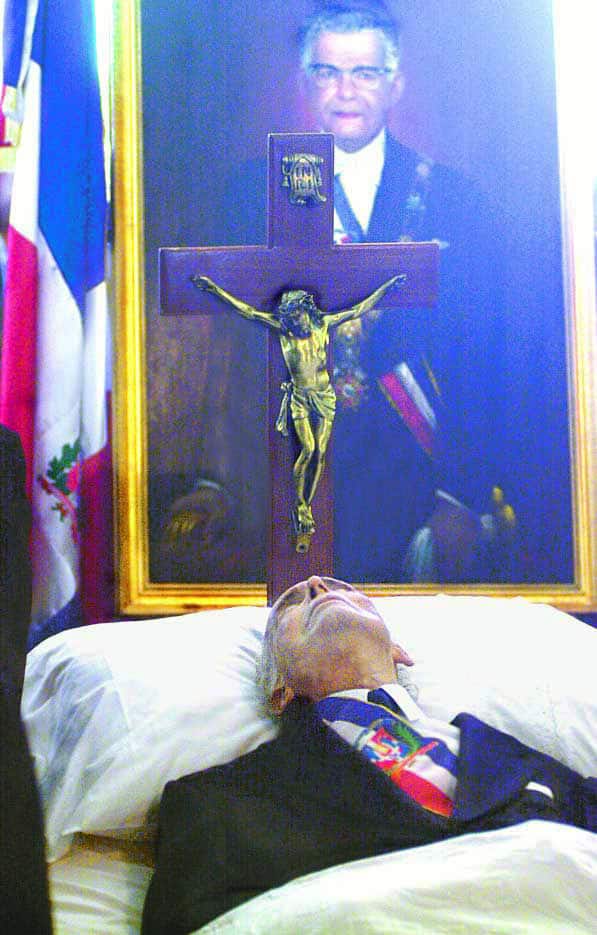A day like today Joaquín Balaguer died

In the early hours of July 14, 2002, Joaquín Balaguer , one of the most influential figures in 20th-century Dominican politics, died. He was 95 years old and died of cardiac arrest , according to official reports. He had been hospitalized in critical condition for ten days due to a bleeding ulcer.
The Government , headed by then President Hipólito Mejía , decreed three days of national mourning .
The wake was held at his residence at 25 Máximo Gómez Avenue —now the headquarters of the Dr. Joaquín Balaguer Specialized Diagnostic Center of the Dominican League Against Cancer—in an atmosphere marked by expressions of collective grief .
"During Trujillo's tyranny, Balaguer held several important positions, including the secretariats of the Presidency, Education, Foreign Affairs, and Vice Presidency. "
Thousands of people came to say goodbye : followers, supporters, figures from different political parties and citizens who, regardless of their affiliation, recognized his historical importance .
During the first day of his wake, there were scenes of crying , pushing, protests, and fainting. The work of the Constitutional Review Assembly , which was debating the reinstatement of consecutive presidential reelection that weekend, was also postponed. His sister Rosa, one of the few surviving relatives, was not immediately informed of his death.
The burial took place three days later, following a funeral lasting more than 16 hours that began at the headquarters of the Social Christian Reformist Party (PRSC) and ended after midnight at the Cristo Redentor Cemetery in the Dominican capital, accompanied by a large crowd. During the ceremony, Rafael Bello Andino, Balaguer's personal secretary for nearly half a century, delivered the official eulogy on behalf of the PRSC.
Before the final procession, the body was displayed at the National Palace and at the Nuestra Señora de La Paz Church , where a funeral mass was held.
The political hustle and bustleJoaquín Balaguer served as President of the Republic seven times and maintained a decisive influence on Dominican political life for more than five decades.
Initiated into politics in 1922, Balaguer was an important activist in the " February Revolution ", which brought down the government of President Horacio Vásquez in 1930.
A writer, academic, and historian , Balaguer earned his law degree from the University of Santo Domingo and his economics degree from Paris . He led an active diplomatic career, developing many of the ideas he would later apply to the highest office in the state.
During Trujillo's tyranny , Balaguer held several important positions , including the secretariats of the Presidency , Education, Foreign Affairs and the Vice Presidency.
In 1960, following the OAS sanctions , Balaguer assumed the Presidency , a position in which he was surprised by the death of Trujillo, subsequently leading the process of "de-Trujilloization" of the country.
Exiled in 1962, he returned three years later to assume the Presidency , following the elections that, in 1966, followed the US military intervention that frustrated the constitutionalist revolution of 1965.
Balaguer ruled the country for twelve turbulent years , handing over power to Antonio Guzmán in 1978, only to regain it from Salvador Jorge Blanco in 1986.

Ten years later, in 1996, Balaguer supported the PLD member Leonel Fernández in a second round of elections .
In 2000, it welcomed the victory of Hipólito Mejía , avoiding a second round of elections .
He died vindicated by all and as the arbiter of major national decisions.
That Sunday, more than twenty years ago, the Dominican Republic began to bid farewell to the indispensable man, as Diario Libre headlined on its front page on Monday, July 15, 2002. He was the last great symbol of a generation that defined the politics of the previous century .
TOPICS -
Diariolibre





